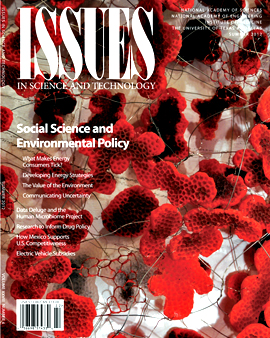Current U.S. drug policy is proving insufficient in shrinking the damage caused by drug abuse, but promising alternative approaches could lead to improved results, according to an article in the summer 2012 edition of Issues in Science and Technology.
Although the current U.S. approach is comprehensive, involving policies ranging from arresting and imprisoning drug dealers to suspending the licenses of drunk drivers, it has failed to reduce the overall size of the problem, according to the article by Mark A.R. Kleiman of the University of California at Los Angeles and colleagues.
They argue that less comprehensive but more targeted drug enforcement might be the better course. These include testing and sanctions programs, interventions to shrink flagrant retail markets, collective deterrence directed at violent drug-dealing organizations, and law enforcement aimed at deterring and incapacitating unusually violent individual dealers.
Also in the summer 2012 Issues, Mark Sagoff of George Mason University argues that a new obsession with collecting huge amounts of data for scientific purposes is not an effective way to conduct research.
Issues in Science and Technology is the award-winning journal of the National Academy of Sciences, National Academy of Engineering, Institute of Medicine, and the University of Texas at Dallas.
The data deluge, Sagoff writes, has become most suffocating in biology. Technological advances make it continually faster and cheaper to produce genomic sequence data than to store, manage, and analyze them. To keep up with the flow of data, some biologists have called for a change in the scientific method from the traditional practice that poses a hypothesis and then pursues the phenomena necessary to test it to a novel approach that uses mathematical tools to scan data for interesting associations.
But Sagoff argues that this results in accumulating oceans of data for no clear purpose, based on the assumption that something in the data will stimulate important questions.
According to an article by Christopher Wilson of the Woodrow Wilson Center in Washington, DC, many feared in the early 1990s that the North American Free Trade Agreement would result in business and jobs moving from the United States to Mexico. But the reality is that economic cooperation with Mexico has been a boon for U.S. industry and has strengthened the country’s competitive position in ways that have produced broad economic benefits. Today, Wilson argues that expanding economic cooperation with Mexico is one of the best ways for the United States to improve its global competitiveness.
